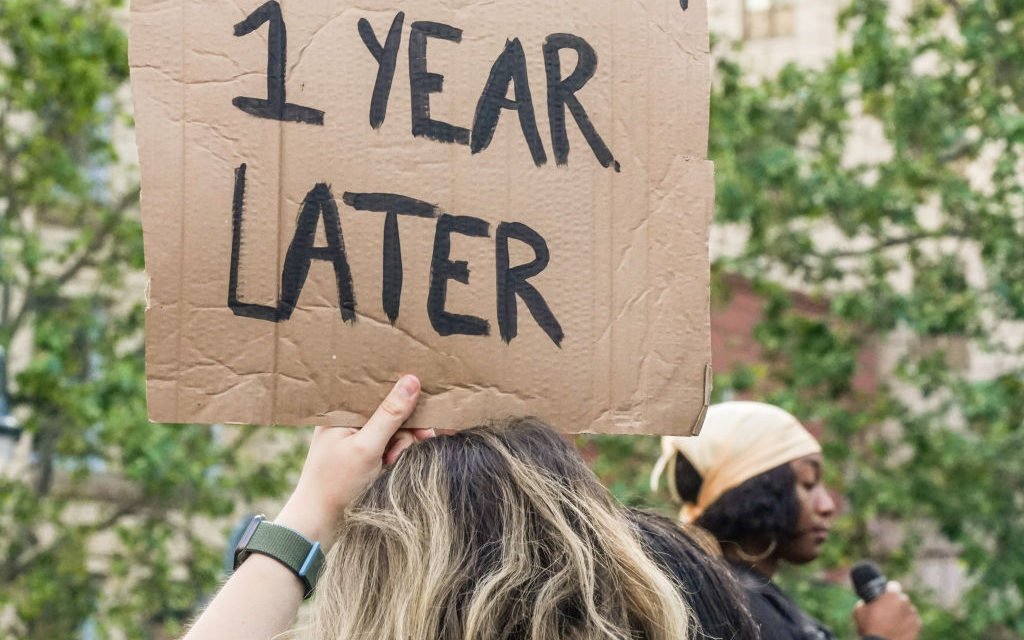
This week is heavy. Tuesday marked the one-year anniversary of George Floyd’s murder—the murder that we all witnessed, that sparked racial protests across the globe at a magnitude we have not experienced in decades. It also ignited energy within organizations to take a stance against racial inequities and avow to be anti-racist. Some statements are proving to be sincere, with sustainable action following, while others seem to be more performative as we see organizations backpedaling and remaining “neutral.”
We’re further reminded that while conversations around racism and racial justice may be on the rise, the system is still the same system. And it is that system that we need torn down and rebuilt to be more equitable and just. Sure, there has been progress to date, and I do not want to diminish that. However, with the progress we have seen, we’re reminded weekly of how far we still have to go, and that the fight cannot end simply because we’ve had a few training sessions on race and anti-racism and put out a few press releases.
We’re reminded that while conversations around racism & #racialjustice may be on the rise, the system is still the same system. And it is that system that we need torn down and rebuilt to be more equitable & just. Share on XOne recent example that confirms that we have still only touched the surface is the news that broke last week that University of North Carolina-Chapel Hill’s Board of Trustees denied Nikole Hannah-Jones a tenured position, despite the support of faculty and the dean of the department. Creator of the New York Times podcast, The 1619 Project, Hannah-Jones was, according to statements from the Board, denied tenure because she did not have a “traditional academic-type background.” Hannah-Jones has received a MacArthur Award, a Pulitzer-Prize, two Polk Awards, a Peabody Award, and three National Magazine awards — more awards than you often see in an department, let alone held by one person! Others at the same school of journalism have received tenure with far fewer and less impressive credentials than Hannah-Jones. With that context, it is safe to surmise that her tenure was denied due to her 1619 Project work.
Over the last year, The 1619 Project has become embroiled in a battle between conservatives and non-conservatives, even sparking the creation of a 1776 Commission by Donald Trump to rebuke the 1619 Project and support what he called “patriotic education” (whatever that means). “This is a political reaction that she created The 1619 Project,” said Jelani Cobb, writer for The New Yorker, in an interview with Marc Lamont Hill, “The idea that racism is not central to the American society, the American establishment, is absurd.”
This further illuminates the strong force that continues to try to erase history – more specifically the history of Black and Brown people in America. W. E. B. DuBois called this the Propaganda of History. Tenure is meant to protect the scholars doing the work to uncover the truth, the real history of the past – those things that others want to be kept buried. Hannah-Jones is a truth seeker. Her 1619 Project work revealed the inconvenient truth of American history. And this makes White people uncomfortable. Other ways we are seeing this same erasure of pieces of history is the continued fight over critical race theory. And in our work, it comes in the form of statements like, “Oh, we’re still talking about this?” “This” being racism, as if it has already been overcome.
Tenure protects scholars doing work to uncover truth & real history – what others want to keep buried. Hannah-Jones' 1619 Project work revealed inconvenient truths of U.S. history. And this makes White people uncomfortable. Share on XSo, I go back to the opening of this post. We are at the one-year anniversary of George Floyd’s murder. In this year of so-called “racial reckoning,” do not confuse loud but empty public statements by organizations and public figures with true change. True change is systemic. The case of Hannah-Jones proves that one year later, we have only barely touched the surface.
In this year of so-called 'racial reckoning,' do not confuse loud but empty public statements by organizations and public figures with true change. True change is systemic. Share on X


















